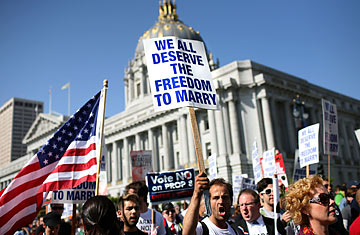
Opponents of Prop. 8 in San Francisco march to the California supreme court in May 2009
Gay-marriage supporters who want to restore California's place at the head of a growing number of states welcoming same-sex marriages are going to have to do it the hard way: by persuading the same neighbors who voted to ban such marriages last fall to change their minds. They aren't going to get any help from the state's supreme court, never mind that Chief Justice Ronald George's historic opinion last May ruled that any discrimination against gays is no less outrageous — and illegal — than discrimination based on race or religion. Despite the sweep of that ruling, George and five other justices ruled on Tuesday that there is nothing so special about gay-marriage rights that make them exempt from the state's famously disruptive and pliable constitutional-amendment process.
"In a sense, petitioners' and the Attorney General's complaint is that it is just too easy to amend the California Constitution through the initiative process," wrote George for the 6-1 majority. "But it is not a proper function of this court to curtail that process; we are constitutionally bound to uphold it." Translation: Until Californians themselves change their system for amending the constitution, it will be the people — not the courts — who have final say on even the most fundamental rights enshrined in the constitution. (See pictures of the gay-rights movement, from Stonewall to Prop. 8.)
Besides, George wrote, Prop. 8 — the initiative that reinstated the ban on same-sex marriages — hardly eviscerates the sweeping opinion he wrote last year. Gays, he said, are still entitled to the highest level of protection against discrimination afforded in the land, except in the instance of marriage.
That's little consolation to the other side, of course. And while the ruling may have taken the issue out of the courts for now, it has placed the issue squarely back on the political front burner. Rick Jacobs, president of the Courage Campaign, a 700,000-member political movement, said efforts to put the issue back before voters as soon as 2010 have already begun. "The initiative process in California is flawed," Jacobs tells TIME. "The very idea that a majority can vote to take rights away from a minority is flawed. It really is quite outrageous."
That view got one vote on the court — that of lone dissenter Justice Carlos J. Moreno. "The rule the majority crafts today not only allows same-sex couples to be stripped of the right to marry that this court recognized [in last year's opinion], it places at risk the state constitutional rights of all disfavored minorities," Moreno wrote. "It weakens the status of our state Constitution as a bulwark of fundamental rights for minorities protected from the will of the majority."
But while the rest of the justices disagreed with Moreno, George's opinion did suggest a way out: Californians could change the constitution again and write in extra safeguards that would make it more difficult for changes to weaken the most important rights enshrined in the constitution. But in saying that, the court also rejected an argument by attorney general Jerry Brown, a likely candidate for governor, who had argued the court should itself declare some rights off-limits to the regular amendment process. George declined, saying that's something only the people can do.
Gay-marriage supporters are now trying to use the same amendment process that created the fix they are in to restore gay marriage. "The tools are what the tools are, and until the process is fixed we don't have any choice," Jacobs says. "We have no choice other than to use the system that is in place."
A new ballot initiative will put California back into the gay-marriage fight, which has considerably broadened in the months since Prop. 8 passed. States like Vermont and Maine have embraced gay marriage, and New York is among others that may do so soon. And in a telling bit of irony, Moreno began his dissent by quoting not from his own court's historic 2008 opinion, but from one issued earlier this year in Iowa. "The 'absolute equality of all' persons before the law [is] 'the very foundation principle of our government,'" he wrote.
